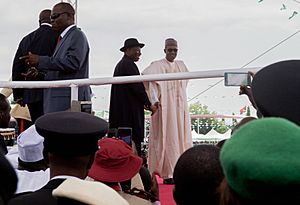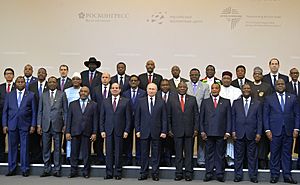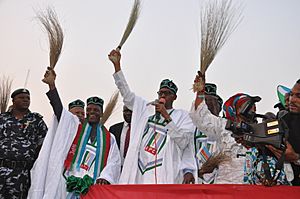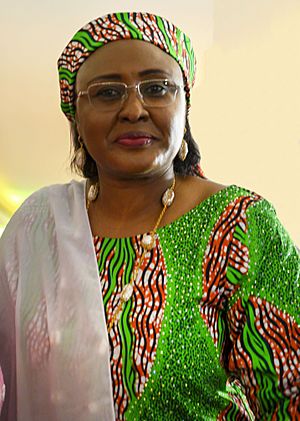Muhammadu Buhari facts for kids
Quick facts for kids
Muhammadu Buhari
|
|
|---|---|
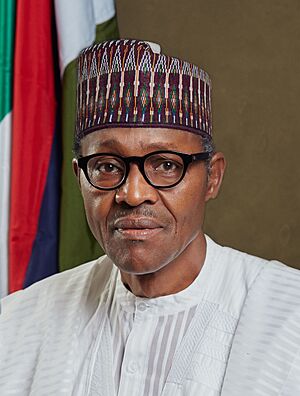
Official portrait, 2015
|
|
| 7th and 15th President of Nigeria | |
| In office 29 May 2015 – 29 May 2023 |
|
| Vice President | Yemi Osinbajo |
| Preceded by | Goodluck Jonathan |
| Succeeded by | Bola Tinubu |
| In office 31 December 1983 – 27 August 1985 as Military Head of State of Nigeria |
|
| Chief of Staff | Tunde Idiagbon |
| Preceded by | Shehu Shagari |
| Succeeded by | Ibrahim Babangida |
| Federal Minister of Petroleum Resources | |
| In office 11 November 2015 – 29 May 2023 |
|
| President | Himself |
| Minister of State | Emmanuel Ibe Kachikwu Timipre Sylva |
| Preceded by | Diezani Allison-Madueke |
| Succeeded by | Bola Tinubu |
| In office March 1976 – June 1978 as Federal Commissioner of Petroleum and Natural Resources |
|
| Head of State | Olusegun Obasanjo |
| Governor of Borno State | |
| In office 3 February 1976 – 15 March 1976 |
|
| Head of State | Murtala Mohammed Olusegun Obasanjo |
| Preceded by | Office established |
| Succeeded by | Mustapha Amin |
| In office 1 August 1975 – 3 February 1976 as Governor of the North-Eastern State |
|
| Head of State | Murtala Mohammed |
| Preceded by | Musa Usman |
| Succeeded by | Office abolished |
| Personal details | |
| Born | 17 December 1942 Daura, Northern Region, British Nigeria (now in Katsina, Nigeria) |
| Died | 13 July 2025 (aged 82) London, England |
| Political party | All Progressives Congress (2013–2025) |
| Other political affiliations |
|
| Spouses |
Safinatu Yusuf
(m. 1971; div. 1988)Aisha Halilu
(m. 1989) |
| Relations |
|
| Children | 10 |
| Alma mater |
|
| Occupation |
|
| Awards | List of honors and awards |
| Nickname | Baba or Baba Buhari |
| Military service | |
| Allegiance | |
| Branch | |
| Service years | 1962–1985 |
| Rank | Major general |
| Conflicts | Nigerian Civil War Chadian–Nigerian War |
Muhammadu Buhari (born 17 December 1942 – died 13 July 2025) was a Nigerian politician. He served as the president of Nigeria from 2015 to 2023. Before that, he was a major general in the Nigerian army. He also led Nigeria as the military head of state from 1983 to 1985.
Buhari ran for president several times. He sought the presidency in 2003, 2007, and 2011. In 2015, he became the candidate for the All Progressives Congress party. He won the election, defeating the sitting President Goodluck Ebele Jonathan. This was a historic moment for Nigeria. He was sworn in on 29 May 2015. In 2019, Buhari was re-elected for a second term.
Contents
- Early Life and Education
- Military Career and Leadership
- Leading Nigeria (1983–1985)
- Life Before Presidency (1985–2015)
- Presidency (2015–2023)
- Post-Presidency (2023–2025)
- Personal Life
- Death
- Honours
- Images for kids
- See also
Early Life and Education
Muhammadu Buhari was born on 17 December 1942. His birthplace was Daura, which is now in Katsina State, Nigeria. He grew up in a Muslim family. His father passed away when Buhari was four years old.
He attended a Qur'anic school and helped with cattle. He completed his primary education in 1953. Later, he went to Katsina Middle School for his secondary education. He graduated from there in 1961. During his school years, he was a house captain and a headboy.
Buhari initially wanted to become a doctor. However, he was advised to join the Nigerian military instead. This path allowed him to pursue higher education.
Military Career and Leadership
In 1962, at 19, Buhari joined the Nigerian Military Training College. He trained as an officer cadet in England. In 1963, he became a second lieutenant. He then served as a Platoon Commander. He continued his military training in Nigeria and the United Kingdom.
From 1965 to 1967, Buhari commanded the Second Infantry Battalion. He also served as a brigade major. In 1966, he participated in a military action that changed Nigeria's leadership. This event led to General Yakubu Gowon becoming the new leader.
Service During the Nigerian Civil War
Buhari played a role in the Nigerian Civil War. He was assigned to the 1st Division. This division moved to Makurdi at the start of the war. He served in various roles, including Adjutant and Company Commander.
His unit participated in early war actions. They captured Ogoja and aimed to advance towards Enugu. Later, he was posted to Nsukka. He served as Brigade Major there.
The Nigerian army adjusted its strategies during the war. They focused on securing communication lines. They also used captured towns to train new soldiers. Buhari's group faced challenges protecting food supply routes.
After the War: New Responsibilities
After the war, Buhari held several important military positions. From 1970 to 1971, he was a Brigade Major/Commandant. He also attended the Defence Services Staff College in India in 1973.
In 1975, Lieutenant Colonel Buhari was part of a group of officers. They helped General Murtala Mohammed come to power. Buhari was then appointed Governor of the North-Eastern State. His role was to improve the state's social and economic conditions.
In 1976, the North Eastern State was divided. Buhari became the first Governor of Borno State. Later that year, he was appointed Federal Commissioner for Petroleum and Natural Resources. In 1977, he became chairman of the Nigerian National Petroleum Corporation.
During his time as Petroleum Commissioner, the government invested in oil infrastructure. They built many petroleum storage depots across the country. They also constructed a pipeline network. Contracts were signed for new refineries and oil pipelines.
From 1978 to 1979, he was Military Secretary at the Army Headquarters. He was also a member of the Supreme Military Council. In 1979, he attended the US Army War College in the United States. He earned a master's degree in Strategic Studies.
Divisional commands held in the Nigerian Army:
- General Officer Commanding, 4th Infantry Division: 1980–1981
- General Officer Commanding, 2nd Mechanised Infantry Division: 1981
- General Officer Commanding, 3rd Armed Division: 1981–1983
Becoming Head of State in 1983
Major-General Buhari was a key figure in the military action of December 1983. This action led to the end of Nigeria's Second Nigerian Republic. At that time, Buhari was leading the Third Armoured Division. After the change in leadership, he became the Head of State.
The new military government aimed to address corruption and economic challenges. They believed the civilian government was not managing the country well. Buhari suspended the constitution to implement new policies.
Leading Nigeria (1983–1985)
As Head of State, Buhari focused on reforming Nigeria's systems. He aimed to reduce government spending and fight corruption. He also wanted to encourage self-employment.
Government Reforms and Anti-Corruption Efforts
The new military government set up a Supreme Military Council. They also reduced the number of government ministries. Laws were put in place to address corruption and maintain order. These laws allowed the military to detain individuals seen as a risk to state security.
The government also launched a campaign against corruption. Many officials were investigated for misusing public funds. Some were jailed. The government also took steps to control public dissent. Strikes and public demonstrations were not allowed.
Buhari's government introduced a law called Decree Number 4. This law aimed to prevent false accusations in the media. It meant that publishing false information about the government could lead to penalties. Journalists and publishers could face fines or jail time.
Economic Policies and Challenges
To improve the economy, Buhari worked to reduce national expenditure. He also aimed to remove corruption from public life. He encouraged local production to reduce reliance on imports. However, strict import controls sometimes made it hard for industries to get raw materials.
Buhari decided not to take a loan from the International Monetary Fund. He preferred to implement his own economic changes. In 1984, he announced a new national budget. This budget included measures like a temporary ban on hiring government workers. It also raised interest rates and cut government spending.
The government prioritized importing raw materials for agriculture and industry. Other economic measures included currency changes and efforts to control prices. Despite these efforts, the economy faced challenges. Inflation rose, and food prices increased.
The War Against Indiscipline
One of Buhari's well-known initiatives was the War Against Indiscipline (WAI). This program started in 1984. It aimed to improve public behavior and civic responsibility in Nigeria. For example, people were asked to form neat queues at bus stops. Government workers were expected to be on time.
The government also introduced strict measures to fight crime. Laws were enacted to investigate corruption and control foreign exchange. These laws allowed the government to freeze bank accounts of suspected fraudsters. They also set penalties for those who violated foreign exchange laws.
In 1985, the government opened borders with neighboring countries. This was done to manage migration and address economic uncertainties. His government faced some criticism regarding its approach to certain issues.
Overthrown in 1985
In August 1985, Major General Buhari's government was overthrown. This was led by Major General Ibrahim Babangida and other military leaders. Buhari was then detained in Benin City until 1988.
Life Before Presidency (1985–2015)
Period of Detention
Buhari was held in a guarded bungalow in Benin for three years. He had access to television. His family members were allowed to visit him with permission.
Civilian Life and Public Service
After his mother's death in December 1988, Buhari was released. He then retired to his home in Daura. During his detention, his relatives managed his farm. He later married his second wife, Aisha Halilu. In Katsina, he became the first chairman of the Katsina Foundation. This foundation aimed to promote social and economic development.
Buhari also served as the Chairman of the Petroleum Trust Fund (PTF). This organization was created to fund development projects across Nigeria. It used revenue from increased petroleum product prices. A 1998 report praised the PTF under Buhari for being transparent and successful.
Presidential Campaigns and Elections
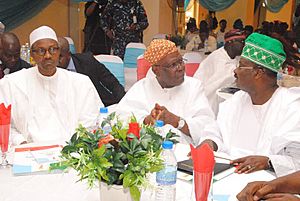
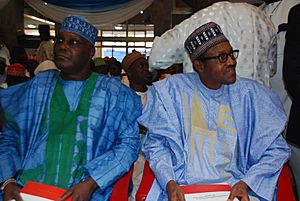
Buhari ran for president multiple times before his successful 2015 bid.
2003 Presidential Election
In 2003, Buhari ran for president as the candidate of the All Nigeria People's Party (ANPP). He was defeated by the sitting President Olusẹgun Ọbasanjọ.
2007 Presidential Election
On 18 December 2006, Buhari was chosen as the ANPP's candidate again. His main opponent was Umaru Yar'Adua. Buhari did not accept the election results.
2011 Presidential Election
In 2010, Buhari left the ANPP and helped found the Congress for Progressive Change (CPC). He became the CPC's presidential candidate in the 2011 election. He ran against President Goodluck Jonathan. Buhari campaigned on an anti-corruption platform. He also supported the enforcement of Sharia law in northern states.
The elections faced challenges, and there were concerns about public order. Buhari claimed the vote was flawed. He remained a popular figure for his strong stance against corruption. He came in second place in the election.
2015 Presidential Election
Buhari ran in the 2015 presidential election as the candidate of the All Progressives Congress party. His campaign focused on his image as an honest leader who would fight corruption. He promised to enhance security in Nigeria.
In 2014, after the Chibok schoolgirls kidnapping, Buhari strongly spoke out against the Boko Haram insurgency. He urged Nigerians to unite against the group. In July 2014, Buhari survived a bomb attack by Boko Haram. His approval ratings increased due to concerns about the fight against Boko Haram.
In February 2015, former Nigerian President Olusegun Obasanjo supported Buhari. On 31 March, President Jonathan called Buhari to congratulate him on his victory. Buhari was sworn in on 29 May 2015. Many heads of state and government attended the ceremony.
Second Inauguration
Buhari's second inauguration took place on 29 May 2019. This marked the start of his second and final four-year term as president. The official swearing-in ceremony was held at Eagle Square in Abuja. Acting Chief Justice Tanko Muhammad administered the oath of office. Several former Nigerian heads of state were present.
Presidency (2015–2023)
During his presidency, Nigeria's economy experienced some challenges. The growth rate was modest, and unemployment remained high. Millions of people faced poverty.
Government Structure and Health
Buhari's key advisers included his nephew Mamman Daura and his Chief of Staff, Abba Kyari. After his second inauguration, Buhari preferred that cabinet members direct requests through his chief of staff. Ministerial positions in Nigeria are designed to represent each state. This means political considerations are important when choosing ministers.
In August 2019, Buhari named his cabinet. It mostly consisted of male members, many of whom were experienced politicians. Some ministers from the previous term were retained.
In May 2016, Buhari canceled a visit to Lagos due to an "ear infection." He traveled to the United Kingdom for medical attention. In February 2017, he asked parliament to extend his medical leave for test results. He returned to Nigeria on 10 March. Vice President Yemi Osibanjo served as acting president during his absence. President Buhari took further medical leave in London in May 2017 and May 2018. He returned to Nigeria on 19 August 2017, after 104 days.
Economic Policies
Buhari was seen by many Nigerians as an honest leader. However, his administration faced economic difficulties. In his first year, Nigeria experienced an economic recession. This was due to a decline in global commodity prices. To raise funds, Buhari sought loans from various countries.
The Nigerian currency, the Naira, faced challenges. Its value decreased in the black market. This led to a shortage of foreign exchange. The government also increased the official price of petroleum. In 2016, the economy declined. Efforts to diversify government income did not improve significantly. The 2018 budget focused on infrastructure projects.
The Central Bank, with Buhari's support, introduced policies to boost agriculture. They encouraged banks to lend to farmers. They also restricted foreign exchange for importing locally grown food.
Social Welfare Programs
In 2016, Buhari launched the National Social Investment Program. This program aimed to help vulnerable people, including children, youth, and women. It had four main parts:
- The N-Power program provided job training and education for young Nigerians. It also offered a monthly stipend.
- The Conditional Cash Transfer Program (CCTP) gave cash to low-income individuals. This helped reduce poverty and improve nutrition.
- The Government Enterprise and Empowerment Program (GEEP) offered interest-free loans. These loans supported farmers, traders, and market women.
- The National Home Grown School Feeding Program (NHGSF) provided free meals to schoolchildren. This aimed to increase school enrollment. It also supported local farmers and women cooks.
In 2019, the program moved to the new Ministry of Humanitarian Affairs. This was done to make the programs more permanent.
Fighting Corruption
Buhari's administration made fighting corruption a key priority. Investigations were launched into past government spending. For example, funds meant for defense were investigated for possible misuse. Many individuals were investigated, and some were convicted.
In 2016, the government introduced a whistle-blowing policy. This policy rewarded people who provided information about financial wrongdoing. Nigeria's anti-corruption agency, the Economic and Financial Crimes Commission (EFCC), reported many convictions. They stated that judges and top military officers were being prosecuted for corruption.
The Chief Justice of the Nigerian Court, Walter Onnoghen, was convicted for not declaring his assets properly. Efforts to fight corruption continued, leading to further investigations and arrests. However, a 2020 report by Transparency International noted that Nigeria still faced challenges with corruption.
Addressing Security Challenges
Buhari's presidency faced several security challenges across Nigeria.
Niger Delta Issues
The Niger Delta region is rich in crude oil. However, oil production has caused environmental damage. The government started the Hydrocarbon Pollution Remediation Project (HYPREP). This project aimed to clean up polluted areas.
There were also attacks on oil facilities by groups like the Niger Delta Avengers. These groups sought greater economic and political autonomy. Such attacks affected oil production and government revenue.
Challenges with Shia Muslims
The Islamic Movement of Nigeria is a leading organization of Shia Muslims. In December 2015, after an incident involving the military, the group's base was affected. Its leader, Sheikh Ibrahim Zakzaky, was arrested. He was held for several years before being acquitted and released in July 2021.
Biafra Separatist Movement
A group called the Indigenous People of Biafra, led by Nnamdi Kanu, gained attention in 2015. They advocated for an independent nation of Biafra. A breakaway Biafra republic had briefly existed during Nigeria's Civil War. Kanu was arrested in October 2015. His arrest led to protests in southeastern states. He later left the country but was brought back to Nigeria.
The Fight Against Boko Haram
Since 2015, the fight against the extremist group Boko Haram intensified. The group split into different factions. The government worked to recover territories held by Boko Haram. In October 2016, the government negotiated a deal. This secured the release of 21 Chibok girls.
By December 2016, much of the territory held by Boko Haram was recovered. Buhari announced that Boko Haram had been largely defeated. The conflict caused many people to leave their homes. In May 2017, 82 more Chibok girls were released. The leader of one Boko Haram faction passed away in May 2021. After this, many members surrendered to the government.
Banditry in Northern Nigeria
Since 2015, the Buhari Administration also dealt with increased banditry in Northern Nigeria. Armed groups engaged in activities like kidnapping for ransom. They also stole livestock and attacked villages. The government worked to address the issue of armed groups and kidnappings. There were concerns about these groups collaborating with other extremist groups.
National Issues and Public Response
Ruga Policy
The Buhari administration introduced the Ruga policy. This policy aimed to help resolve conflicts between nomadic Fulani herdsmen and farmers. It proposed creating special communities for herders. This would allow them to raise cattle without constantly moving. The policy was later suspended.
Discussions on Governance Style
Buhari's leadership style sometimes led to discussions. Some people expressed concerns about the balance between strong governance and democratic principles. Media outlets also commented on his approach to leadership.
COVID-19 Pandemic Response
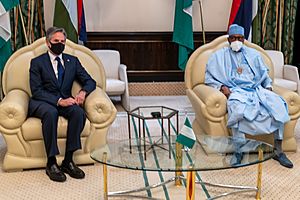
Following the outbreak of the COVID-19 pandemic in Nigeria, Buhari established a Presidential Task Force. This team was set up to control the virus in the country. In March 2020, Buhari announced a two-week lockdown in major cities. The task force later warned about a potential second wave of the virus.
End SARS Protests
In October 2020, protests against alleged police misconduct erupted. These protests were against a special police unit called the Special Anti-Robbery Squad (SARS). The End SARS movement called for police reforms.
On 12 October, Buhari announced the disbandment of SARS. He promised extensive police reforms. The Inspector General of Police announced a new unit, SWAT. However, many demonstrators wanted a more complete overhaul of the police system. Protests continued, and there were clashes. In June 2021, Buhari ordered a nationwide deployment of police and army. This was to prevent planned anti-government protests.
Foreign Relations
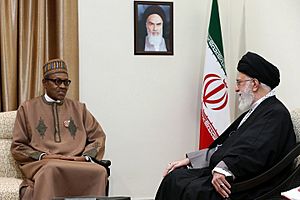
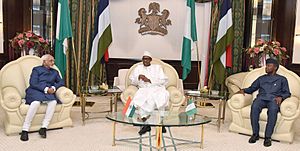
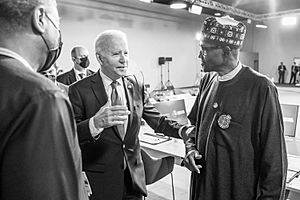
Buhari commented on international issues. He described the military actions against Rohingya Muslims in Myanmar as ethnic cleansing. He warned of a potential disaster.
Nigeria and South Africa are major economies in Africa. However, both countries face high poverty and unemployment. Many Nigerians have moved to South Africa for better opportunities. Tensions sometimes arose between migrants and local people. Leaders from both countries met to improve their relationship.
Buhari was the first president to call for a global treaty. This treaty aimed to end violence against women and girls.
Post-Presidency (2023–2025)
Buhari peacefully handed over power to his successor, Bola Tinubu. This happened on 29 May 2023, at a ceremony in Eagle Square. After the handover, he returned to his home state of Katsina. He was welcomed by state and traditional leaders. He then retired to his farm and family home in Daura.
Personal Life
Family
In 1971, Buhari married his first wife, Safinatu. They had five children: four girls and one boy. Their first daughter, Zulaihat, was named after Buhari's mother. Their other children were Fatima, Musa (who passed away), Hadiza, and Safinatu. Buhari and Safinatu divorced in 1988. Safinatu passed away in 2006. In 2012, his first daughter, Zulaihat, also passed away.
In December 1989, Buhari married his second wife, Aisha Buhari. They had five children together: a boy and four girls. Their children are Aisha, Halima, Yusuf, Zahra, and Amina. Yusuf married Zahra Nasir Bayero in August 2021.
Buhari was a Muslim.
Wealth
In 2015, Buhari declared his assets. These included US$150,000 in cash. He also owned five homes and two mud houses. He had farms, an orchard, and a ranch with cattle, sheep, horses, and birds. He also held shares in three companies and owned two undeveloped plots of land and two cars. These assets were bought from his savings.
Death
Muhammadu Buhari passed away on 13 July 2025. He died in London, United Kingdom. He was receiving medical treatment after being hospitalized. He was 82 years old.
Tributes
Following Buhari's death, Nigerian President Bola Ahmed Tinubu spoke about his legacy. Tinubu described it as lasting and important for Nigeria's democracy. President Tinubu asked Vice-President Kashim Shettima to travel to the United Kingdom. He was to accompany Buhari's body back to Nigeria.
Honours
National Honours
 Nigeria:
Nigeria:
 Grand Commander of the Order of the Federal Republic (GCFR) (1983)
Grand Commander of the Order of the Federal Republic (GCFR) (1983)
Foreign Honours
 Benin:
Benin:
 Equatorial Guinea:
Equatorial Guinea:
 Guinea Bissau:
Guinea Bissau:
 Liberia:
Liberia:
 Niger:
Niger:
 Portugal:
Portugal:
 Grand Collar of the Order of Prince Henry (30 June 2022)
Grand Collar of the Order of Prince Henry (30 June 2022)
 Senegal:
Senegal:
 Serbia:
Serbia:
Traditional Titles
In 2017, traditional rulers in South-East Nigeria honored President Buhari. They gave him the chieftaincy titles of Enyioma I of Ebonyi and Ochioha I of Igboland. He already held the title of Ogbuagu I of Igboland. The following year, he received another title, Ikeogu I of Igboland.
Images for kids
-
Buhari with Russian President Vladimir Putin, Venezuelan President Nicolás Maduro and other leaders at the Third GECF summit in Tehran
See also
 In Spanish: Muhammadu Buhari para niños
In Spanish: Muhammadu Buhari para niños
- List of heads of state of Nigeria
- List of Nigerians
- List of Hausa people
 | DeHart Hubbard |
 | Wilma Rudolph |
 | Jesse Owens |
 | Jackie Joyner-Kersee |
 | Major Taylor |


